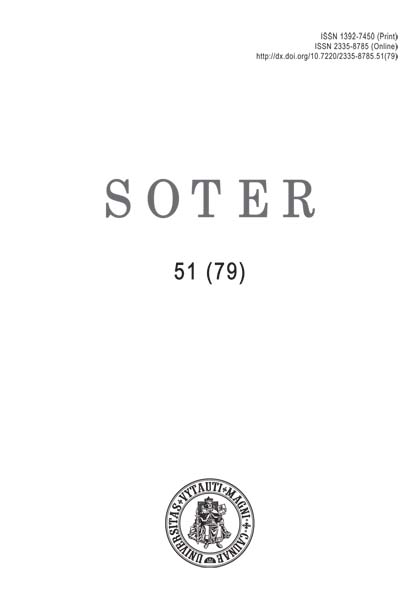Daugiaplanė Katalikų Bažnyčios vargonininko profesija: tradicijų pastovumas ir kaita
Multifunctional profession of a Catholic Church organist: the constancy and change of the traditions
Author(s): Eglė Šeduikytė-KorienėSubject(s): Christian Theology and Religion
Published by: Vytauto Didžiojo Universitetas
Keywords: Bažnyčios vargonininkas; Daugiaplaniškumas; Socialinis statusas; Profesinė kom¬petencija; Vargonininko misija; Church organist; Multifunctionality; Social status; Professional competence; Mission of organist
Summary/Abstract: Straipsnyje siekiama apžvelgti profesinį bažnyčios vargonininko kelią Lietuvoje nuo XIX a. paskutinių dešimtmečių iki šių dienų, išryškinti socialinius veiksnius, lėmusius bažnyčios vargonininko profesijos raidą, išskirti tradicijų kintamumo ir pastovumo tendencijas, atskleisti profesijos daugiaplanį pobūdį. Multifunkcionalumas būdingas daugumai muziko profesijų, bet tai ypač taikytina bažnyčios vargonininko profesijai. Šis straips-nis – kultūrinės plėtros projekto „Atlikėjo polifunkcionalumas muzikiniuose, kultūriniuose ir socialiniuose procesuose“, finansuojamo Lietuvos mokslo tarybos (sutarties nr. MIP-095/2013), dalis. The profession of organist is one of the most deeply rooted musical professions in the history of Europe, as well as Christian Lithuania (since 1387). The profession of church organist encompasses a particularly wide spectrum of activity. The church organist is a performer, a teacher, a choir leader, a conductor, a vocal specialist, an improviser, an expert of liturgics, and also rather commonly a composer. Many renowned composers used to play the organ at church at the beginning of their professional careers. In the late 19th century and the first decades of the 20th century organists in Lithuania were pioneers of music culture, educators of the public and organisers of cultural life. The organists who worked in Lithuania were the primary teachers of music, and in their role as teachers at congregational schools many used to teach not only music, but also foreign languages. Organists were developing national awareness in Lithuanian people by promoting old Lithuanian chanting and folk songs. They started a choir movement, which later developed into Lithuania-wide song festivals and played a vital role in the struggle for the independence of Lithuania. In the late 19th century and in the first half of the 20th century the socio-economic status was one of important aspects behind the slow growth of professional competence of church organist. Organists had to make their living from music, but besides their main job, i.e. playing the organ at Mass, they were involved in a number of other tasks without direct relation to the musician’s profession. Organists in small parishes found themselves in an extremely difficult financial situation. The non-existence of professional and social status of a church musician and absolute dependency on the employer, who usually had no interest in developing musical knowledge of an organist, continued to limit learning opportunities for organists. Professional and financial situation of organists and benefits at old age were totally dependent on priest’s generosity and on donations collected from penniless and poorly educated parishioners.
Journal: SOTER: religijos mokslo žurnalas
- Issue Year: 79/2014
- Issue No: 51
- Page Range: 75-88
- Page Count: 14
- Language: Lithuanian

